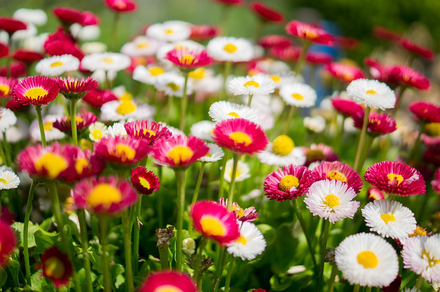Wonderfully fragrant meadows, blossoming fruit trees, cornflowers, poppies and sunflowers on the roadside and field margins. We all love these landscapes and enjoy the scent that they exude. It is no different for bees; they are dependent on the diversity and succession of flowers until autumn. Through their pollination, bees contribute significantly to the preservation of biological diversity. But we humans can also make a significant contribution to maintaining biodi-versity and variety in our own surroundings. It is extremely important to protect the habitat of the honeybee. Of course not everybody can do everything, but everybody can do something. Some examples:
Anyone can make their garden or balcony into a suitable feeding area for bees.
Bee meadows are ideal. Bee meadows contain plants that are particularly rich in nectar and pollen, such as bird cherry, mountain ash, trumpet tree, privet, hydrangea, hawthorn, clematis, snowdrops, forget-me-not, echinacea, lavender, thyme, chives, cosmos and aster.
Dare to be wild: lawns do not have to be mowed every week. This allows wild plants, clover and meadow sage to emerge, providing a food source for bees.
Chamomile, lavender, lemon balm, sage, thyme, marjoram and bluebells, for example, are suitable for balconies and terraces.
Another way to provide a new home for other pollinators such as wild bees is to create nesting places. Holes drilled in wood blocks are one example. When you buy them, you should make sure there are no splinters sticking out, as the animals could hurt themselves. The nest sites should be placed where the sun will shine on them for a few hours each day. Without sunlight, there is a risk that there will be too much moisture in the nest, which could destroy the animals’ food supply.
The bee is the perfect pet for city-dwellers. In parks and gardens, on balconies, on overgrown land and even on planted traffic islands, bees can find an ample food supply that often yields twice as much as in the countryside. Many prominent buildings such as museums and theatres now open their roofs for urban beekeepers to provide space for beehives.
As consumers we have an influence on the state of our environment. The more consciously and locally we shop, the more we can work towards biodiverse agriculture. So check your shopping basket every now and then. Support beekeepers in your country when you buy honey by making sure it is controlled and produced under bee-friendly circumstances.
With bee sponsorship, anyone can actively support beekeeping. Bee sponsorship usually lasts a year. The sponsor pays a certain amount, which funds the various bee projects of the bee sponsorship provider. Each provider has its own focus when it comes to saving bees. You should therefore find out beforehand which specific projects are to be supported through bee sponsorship.
Jam manufacturers in our group, such as Schwartauer Werke are reliant on bee pollination, as without bees there would be no fruit and without fruit there would be no jam. With the bee careful initiative, Schwartauer Werke and other Hero group-relying manufacturers draw attention to this relationship and support targeted measures to protect the health of bees and fruit diversity. Be part of this initiative and do something to boost the bee population and bee health. We have lots of opportunities!
Strawberries, cherries, apricots, plums, currants, raspberries, blueberries. The variety of fruit at our latitude is enormous. We enjoy them in all possible forms.








